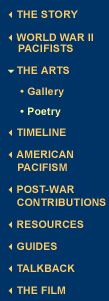
|
 |
 |


 |
 |
 |

Objector
by William Stafford
In line at lunch I cross my fork and spoon
to ward off complicity-the ordered life
our leaders have offered us. Thin as a knife,
our chance to live depends on such a sign
while others talk and The Pentagon from the moon
is bouncing exact commands: "Forget your faith;
be ready for whatever it takes to win: we face
annihilation unless all citizens get in line."
I bow and cross my fork and spoon: somewhere
other citizens more fearfully bow
in a place terrorized by their kind of oppressive state.
Our signs both mean, "You hostages over there
will never be slaughtered by my act." Our vows
cross: never to kill and call it fate.
|
 |
 |
 |
 |
 |
 |

War Elegy XI
(The Internment, Waldport, Oregon; January, 1943)
by William Everson
To sunder the rock that is our day,
In the weak light
Under high fractured cliffs,
We turn with our hands the raw granite;
We break it with iron.
Under that edge it suffers reduction.
Harsh, dense and resistant,
The obdurate portions
Flaw and divide.
We wait suspended in time
Locked out of our lives we abide, we endure
Our temporal grievance diminished and slight
In the total awareness of what obtains,
Outside, in the bone-broken world.
Confronting encroachment the mind toughens and grows.
From this exigency both purpose and faith achieve
coherence:
Such is our gain.
We perceive our place in the terrible pattern,
And temper with pity the fierce gall,
Hearing the sadness,
The loss and the utter desolation,
Howl at the heart of the world.
|
 |
 |
 |
|
